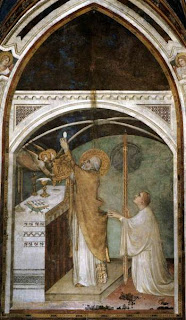Tag Archives: liturgy
History of Latin Mass in Pittsburgh
The Pittsburgh Catholic has a decent surface-level summary of Pittsburgh’s Latin mass community.
Latin Mass has history in Pittsburgh Diocese
“…[T]he Diocese of Pittsburgh formed a committee in early in 1989, and the celebration of Mass in Latin was reintroduced in the diocese on June 11, 1989, at two locations: the Duquesne University chapel and SS. Peter and Paul Parish in Beaver.”
Praying for the Conversion of Jews
Since the release of Summorum Pontificum, various talking heads have been apoplectic because the Tridentine mass includes a Good Friday prayer for the conversion of the Jews. Much ado is being made of nothing, though.
Did Bishop Trautman Even Read the What the Pope Wrote?!
If you thought the diocese of Pittsburgh’s memo about Summorum Pontificum was bad, you ain’t seen nuthin’ yet. Check out this nonsense from Erie:
The recent apostolic letter of Pope Benedict XVI on widening the use of the
liturgical books of 1962 is prompted by his desire to reach out to those Catholics in schism because of their non-acceptance of the liturgical reforms of the Second Vatican Council.
Memo to Pittsburgh Priests on Motu Proprio
The ink on Summorum Pontificum was barely dry before officials for the diocese of Pittsburgh sent out a memo that “rewrite[s] what the pope actually said in the motu proprio“, making it essentially moot here. Following is the controversial section.
In parishes where a group of faithful attached to the previous liturgical tradition exists stably, pastors are exhorted to willingly allow public Masses for the people using the Roman Missal of Pope Blessed John XXIII but no more that one per Sunday and feast days.The celebration of baptism, penance, anointing of the sick, weddings and funerals in the older rite is permitted in these parishes. In our diocese, the only parish that qualifies under this norm is Holy Wisdom Parish (Saint Boniface Church) located on the Northside of Pittsburgh. Since 1989 the Diocese of Pittsburgh has approved the celebration of the Roman Missal of Pope Blessed John XXIII of 1962. This extraordinary expression of the law of prayer of the Catholic Church is celebrated on Sundays and holydays of obligation at Saint Boniface Church (Holy Wisdom Parish). In addition, the diocese has permitted at Saint Boniface Church the celebration of baptism, penance, weddings and funerals according the rites of 1962 and has granted permission for the celebration of the Roman Missal of Pope Blessed John XXIII on other special occasions. Finally, the celebration of the Triduum using the 1962 Roman Missal has also been permitted at Saint Boniface Church.
